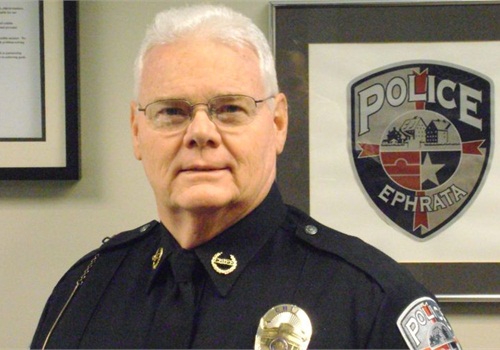

| Visitors Now: | |
| Total Visits: | |
| Total Stories: |

| Story Views | |
| Now: | |
| Last Hour: | |
| Last 24 Hours: | |
| Total: | |
Know Your Place: A Response
Transcript used in the video:
Howdy y’all, Pete here from CopBlock.org.
Recently a couple of friends shared with me an article entitled “Know Your Place”, which was posted to PoliceMag.com by William Harvey.
I thought it important to weigh-in on.
Specifically, I hope to share some thoughts with current law enforcement employees, as that was the intended audience of the original article.
Please do familiarize yourself with Harvey’s piece, so you can see that I’m not trying to distort his main thrust, which advocates that law enforcement employees defer to their superiors, especially when in the presence of “citizens”.
Failure to do so, Harvey worries, can cause “citizens” to view your specific agency or the institution of law enforcement itself, with less respect.
A few points made by Harvey that caught my attention:
The prolific use of the word “citizen.”
In seven paragraphs it’s used eight times.
Why, you ask, did this stand out to me?
Because viewing a person as a “citizen” infers that there’s another group, which I’m pretty sure Harvey would identify as LEOs.
So what’s the big deal?
If one creates such distinctions, and operates with such a paradigm, people are viewed according to a category.
It only creates and perpetuates division, which doesn’t set the stage for a harmonious coexistence.
Moving on.
 Harvey claims that “law enforcement is stepped in para-military tradition” – assuming that’s a factual statement, which I don’t, though the trend has become so – is that a good thing?
Harvey claims that “law enforcement is stepped in para-military tradition” – assuming that’s a factual statement, which I don’t, though the trend has become so – is that a good thing?
Do you really want to live in a militarized society?
Do you want your kids to grow-up in a community where fear is used as the rationale to erect a police state?
Harvey makes a couple of statements that show to me, his underlying motivation – the control of perception.
A couple of phrases he used: “diminishes his position in the citizen’s eyes” and “how we are judged by the public.”
It seems Harvey is concerned not with reality, but in window-dressing.
He goes on:
“I know that there are times you may despise your supervisor. You don’t want them around you but due to assignments or situations they’re going to be there. If you don’t respect them as an individual, respect the rank and uniform they represent. If you disrespect the rank by showing this disregard for your agency’s leaders, you’re setting yourself up for problems.”
To summarize: never criticize – it’s dangerous!!
In fact, criticism, constructive criticism is healthy and necessary to any effective relationship – be it among lovers or colleagues – and to any endeavor.
Being admonished for questioning the so-called “leaders” seems just a bit dictatorial.
If such a structure is good for law enforcement, as Harvey claims, then why not apply the same self-censorship to all aspects of life?
That would be a pretty grim world.
When this video was recorded Harvey’s article had netted only a couple of comments, but they were insightful.
In one, Marc notes that if an action wrong for a “citizen” then it’s wrong for a LEO.
I’d agree – but think Marc fails to take his point to its logical conclusion.
If one would agree that theft is wrong but support law enforcement, as it’s currently structured, they’re lying to themselves, as the institution and its actors operate based on theft.
Law enforcers today claim a “legitimate” right to initiate force – to steal the wealth created by others in their community, to then protect them.
Seems a bit paradoxical, don’t you think?
The second commentor – Jeffrey – notes that “A bad order is a bad order, but as long as it’s not illegal, immoral or unethical (and most aren’t) then we have an obligation to follow it.”
But is that true?
Again, every action taken by law enforcement employees today is ultimately couched on the fact that the good supplied – security or safety – was facilitated through the use or threat of force.
Is that ethical?
True, Harvey’s goal – mutual respect – is admirable, but real respect is not gotten through orders.
Might there be another way that goal could be accomplished other than repeatedly denoting just how critical it is that subordinates obey rank so that the reputation their department not be tarnished?
In fact, I’d argue that putting anything – be it a person or an institution – up on a pedestal and ignoring or actively sidestepping wrongs, creates a bad situation.
Most now employed as police are not bad people, but they’re caught-up in a system built on a flawed foundation.
Instead of telling police employees that they should act a certain way, might it be better if the provision of law enforcement had such incentives built-in?
I encourage you to check out the resources housed at CopBlock.org/WelcomeLEOs to consider how law enforcement could be supplied like any other good or service, via consensual interactions.
Thanks for your time. I appreciate you exposing yourself to other perspectives.
Text of original article
by William Harvey, published to PoliceMag.com on Dec. 18, 2012
“Hey, buddy” is not the way to start a conversation with a superior officer. Introducing your watch commander to a citizen as “Wild Bill” is far too informal and diminishes his position in the citizen’s eyes. This happens far more than you think. Matter of fact, I was on the receiving end of both of these. Let’s get the decorum lesson behind us.
Law enforcement is steeped in para-military tradition. Rank structure is a key to our successes. You are taught this in the academy, some of us lived this in the military and structure must be adhered to. I’m not talking about calling a commander by his rank if you two are out fishing. There can be friendships, despite the strict fraternizing policies of some departments.
When you introduce your supervisor to a citizen with their proper rank, you set the following standards. First, you show respect toward the department and what it stands for. If the citizen has a problem, complaint or this incident requires somebody from a higher pay grade, they should know it.
This high rank is there to be a problem solver or solution provider with this circumstance. No offense, I’ve known a few cops named Bubba and Snake. And I’ve been referred to as Wild Bill (don’t know how I ever got that nickname). However, the informed citizen knows circumstances can require someone from higher up the flagpole.
To meet and greet the supervisor who will cure their situation will reek to no end if they are called Wild instead of their respective rank. Also, this informal name will assure the citizen that the fix is in. If the supervisor is on a first named basis, the citizen may believe they won’t get equitable treatment. The flip side of this is that when interacting with citizens, the commander must use the proper title for their staff as well. This shows the outsider that we have mutual respect for each other, exhibiting professionalism. It is all based on respect of the system.
I know that there are times you may despise your supervisor. You don’t want them around you but due to assignments or situations they’re going to be there. If you don’t respect them as an individual, respect the rank and uniform they represent. If you disrespect the rank by showing this disregard for your agency’s leaders, you’re setting yourself up for problems. I’ve seen this disdain later set the stage for a charge of insubordinate behavior, which is serious at any department and should never be tolerated. If you let your anger or disdain bubble up, you’ll let it slip out at the most inopportune time.
How we treat each other and the respect we show our agency is often how we are judged by the public. If we act like professionals without causing citizens to suspect hooliganism, then we will be seen as professionals. If we lower our standards of respect, we are no more than a group of workers. Keep our vocation at a professional level.
Know Your Place: A Response is a post from Cop Block – Badges Don't Grant Extra Rights
2012-12-21 10:02:13
Source: http://www.copblock.org/25263/know-your-place-a-response/
Source:




